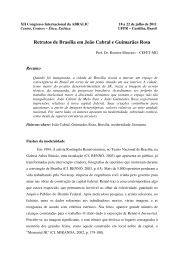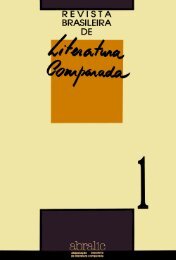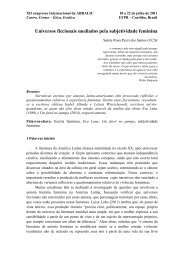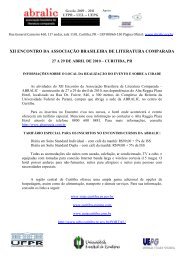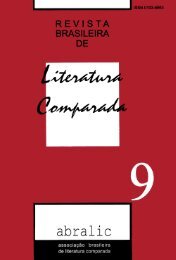download da revista completa (pdf - 9.225 Kb) - Abralic
download da revista completa (pdf - 9.225 Kb) - Abralic
download da revista completa (pdf - 9.225 Kb) - Abralic
You also want an ePaper? Increase the reach of your titles
YUMPU automatically turns print PDFs into web optimized ePapers that Google loves.
10 Revista Brasileira de Literatura Compara<strong>da</strong>, n° 3<br />
of a national identity, or as participating in the exploration of possible functions<br />
of the human mind) - so that an unproblematic encounter between<br />
discourses like those of Egyptology and literary theory (on the basis of an<br />
identical or at least similar relationship to their objects) is very unlikely.<br />
This is why, if we are serious about finding an answer, we must begin by<br />
contextualizing the question of whether Egyptology needs a theor)' of literature.<br />
We will therefore take a closer look at the historical circumstances that<br />
accompanied the emergence and the development of both Egyptology (I) and<br />
of literary theory (2) in order to identify possible epistemological and discursive<br />
asymmetries (3) between them, asymmetries which ma)' potentiaUy<br />
complicate their dialogue. While such a contextualization wiU indeed enable<br />
us to come up with an answer or, ralher, with a series of answers to our key<br />
question, these answers will remain obliqlle because. as we wiU see, the<br />
relationship between Egyplology and literar)' theory proves to be not a particularly<br />
easy one. The contemporary slale of Egyptological research offers<br />
highly interesling results to lhe disciplines in its scholarly environment (4)<br />
but, on the other hand, literary theory has a tendency to<strong>da</strong>y, stronger perhaps<br />
than ever before, of suggesting a thorough historization of the concept of<br />
"literature". Once we know which specific varieties of literature literary<br />
theory is actuaUy dealing with, this may generate serious scepticism about the<br />
applicability of results coming from literary theory to a culture as remote<br />
from the occidental tradition as that of Ancient Egypt. (5) But, then, turning<br />
around the initial question, should one not at least say that literary theory<br />
needs Egyptology? The answer is, once again, complex (6) - for it depends<br />
on how we determine the tasks and functions of literary theory. One expectation,<br />
however, remains stable within and despite such considerable complexities.<br />
With literary theory or withoUI it, Egyplologists wiU find fascinated<br />
readers inside and outside of the academic world.<br />
1<br />
It is almost uncanny to read that, several centuries ago, lhe sites of lhe<br />
pyramids were "a favorite riding, hunting and tournament ground for lhe<br />
social and military elites of Muslim Egypt" and that, for the longest time. the<br />
worldview of Islam attributed <strong>da</strong>ngerous magic int1uences to the remainders<br />
of that remote culture which nobody could understand because nobody could<br />
decipher its writing. Even those Ancient Greek authors who had accumulated<br />
such an impressive body of knowledge about the history and the institutions<br />
of their neighboring empire gave Egypt a "marginal position" within their<br />
own mappings. From the angle of the Christian tradition, final1y, the<br />
pyramids and their world were, so to speak, in a relation of half distance<br />
because, on the one side, motifs from Egyptian narratives, mediated through




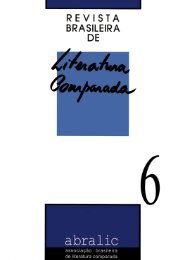
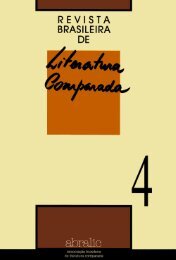

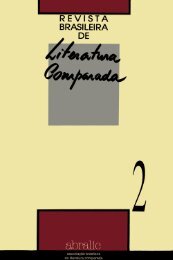
![Olhar Viajante, de Maria Lúcia Medeiros: [homo]erotismo ... - Abralic](https://img.yumpu.com/38407389/1/184x260/olhar-viajante-de-maria-lacia-medeiros-homoerotismo-abralic.jpg?quality=85)
